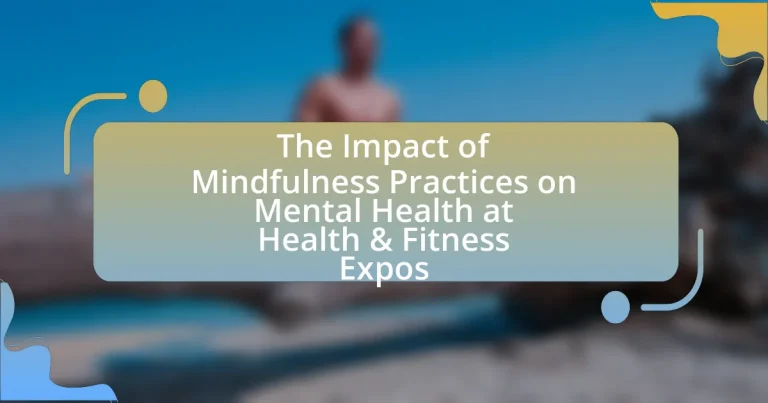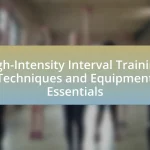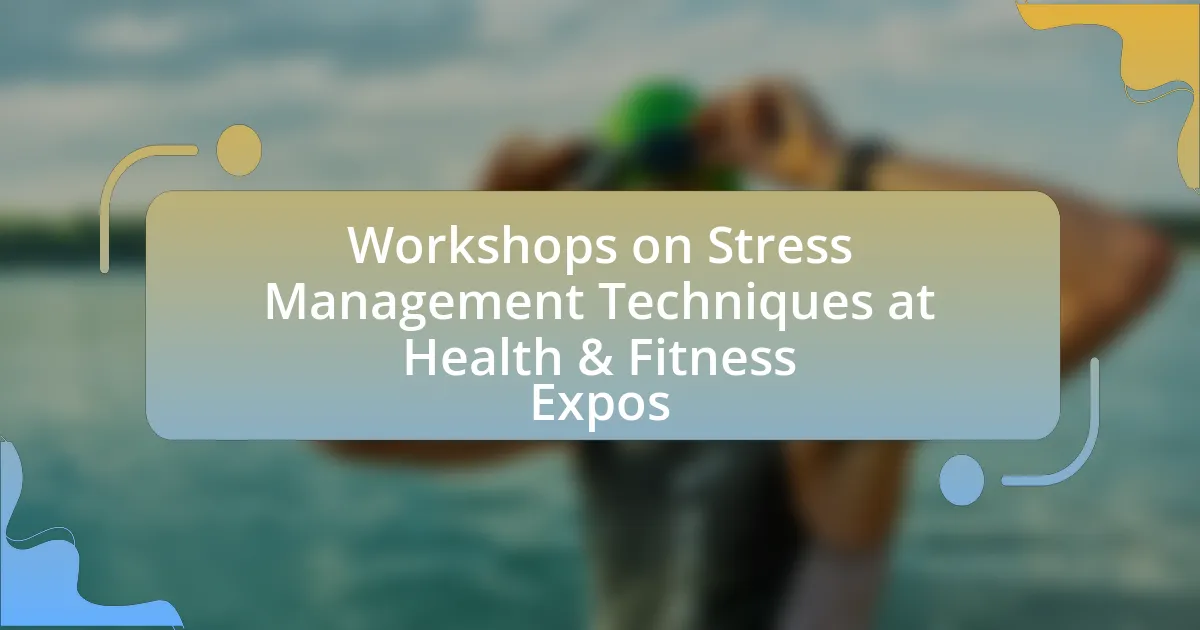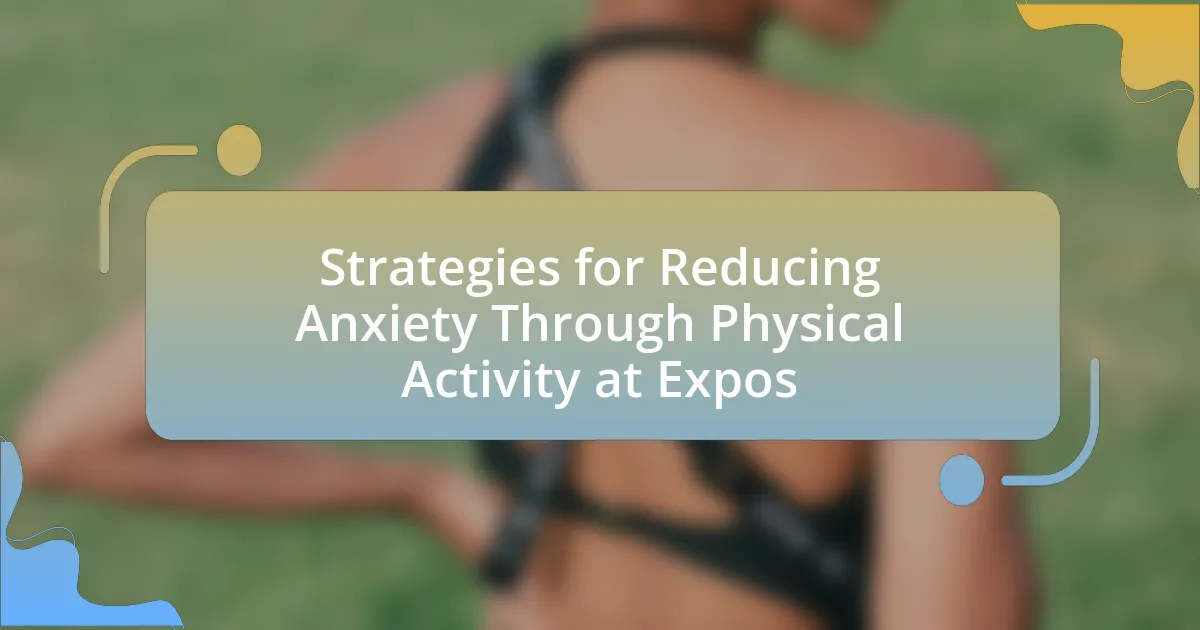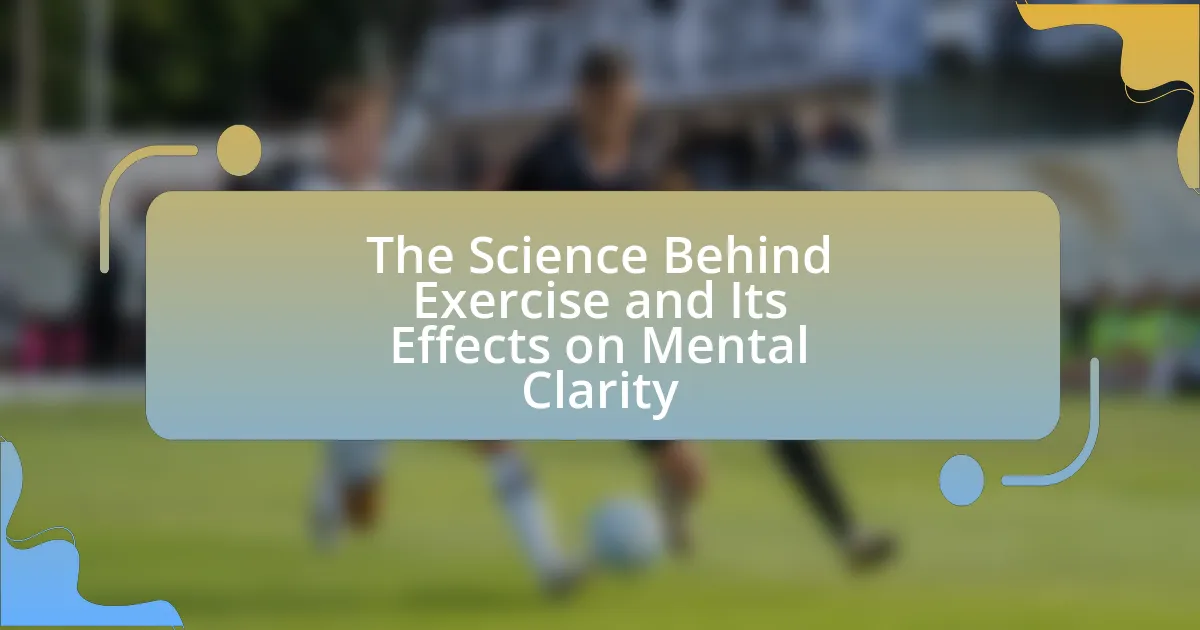The article examines the impact of mindfulness practices on mental health at health and fitness expos, highlighting their role in reducing stress and anxiety among participants. It discusses various mindfulness techniques, such as meditation and deep breathing, and their effectiveness in enhancing emotional regulation and overall well-being. The article also emphasizes the significance of health and fitness expos in promoting mindfulness, raising mental health awareness, and providing access to mindfulness resources. Additionally, it reviews research studies that support the benefits of mindfulness practices and offers strategies for participants to maintain these practices post-expo for long-term mental health improvements.
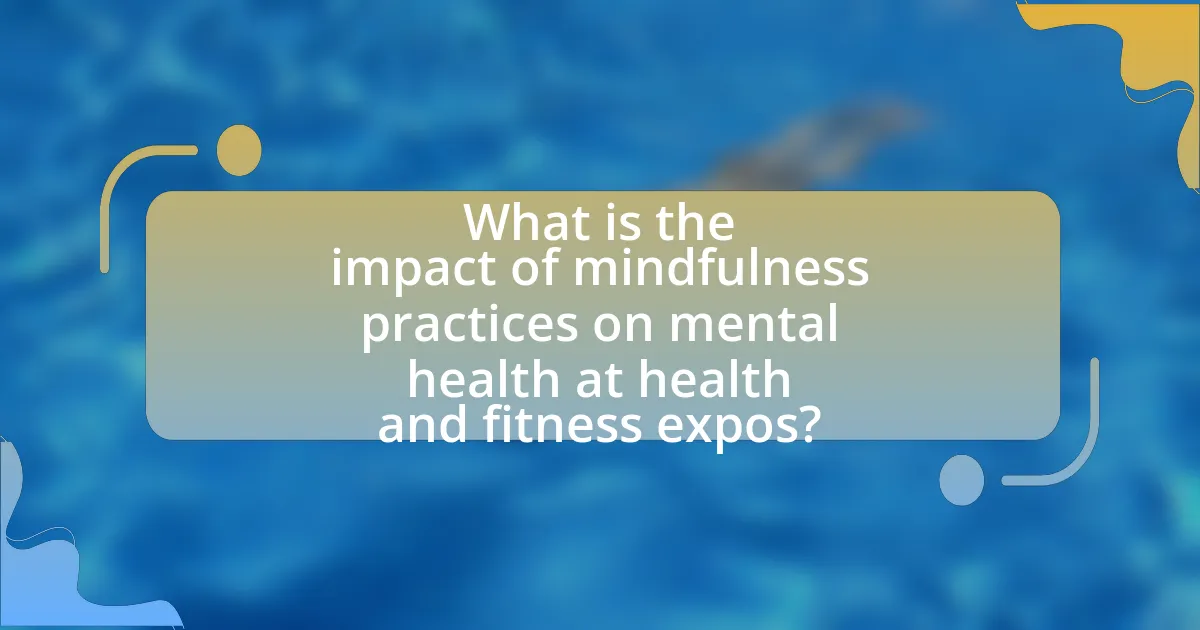
What is the impact of mindfulness practices on mental health at health and fitness expos?
Mindfulness practices significantly enhance mental health at health and fitness expos by reducing stress and anxiety levels among participants. Research indicates that engaging in mindfulness techniques, such as meditation and deep breathing, can lead to measurable decreases in cortisol, the stress hormone, thereby promoting a sense of calm and well-being. A study published in the Journal of Health Psychology found that individuals who practiced mindfulness reported lower levels of anxiety and improved emotional regulation during fitness events. This positive impact on mental health not only fosters a more enjoyable experience at expos but also encourages long-term adherence to health and fitness routines.
How do mindfulness practices influence mental well-being?
Mindfulness practices significantly enhance mental well-being by reducing stress, anxiety, and depression while improving emotional regulation and overall life satisfaction. Research indicates that mindfulness meditation can lead to structural changes in the brain, particularly in areas associated with emotional regulation, such as the prefrontal cortex and amygdala. A study published in JAMA Internal Medicine found that mindfulness meditation programs can improve anxiety, depression, and pain, demonstrating a measurable impact on mental health. Furthermore, consistent mindfulness practice has been linked to increased resilience and a greater sense of purpose, contributing to improved mental health outcomes.
What specific mindfulness techniques are commonly used at health and fitness expos?
Common mindfulness techniques used at health and fitness expos include guided meditation, breath awareness exercises, and yoga sessions. Guided meditation helps participants focus their thoughts and reduce stress, while breath awareness exercises promote relaxation and mindfulness in the present moment. Yoga sessions combine physical movement with mindfulness, enhancing both mental and physical well-being. These techniques are often incorporated into workshops and demonstrations, providing attendees with practical tools to improve their mental health and overall wellness.
How do these techniques contribute to improved mental health outcomes?
Mindfulness techniques contribute to improved mental health outcomes by reducing stress, anxiety, and depression while enhancing emotional regulation and overall well-being. Research indicates that mindfulness practices, such as meditation and focused breathing, activate brain regions associated with emotional control and resilience. A study published in JAMA Internal Medicine found that mindfulness meditation programs significantly improved anxiety, depression, and pain, demonstrating a 30% reduction in symptoms among participants. These techniques foster a greater awareness of thoughts and feelings, enabling individuals to respond to stressors more effectively, which leads to better mental health outcomes.
Why are health and fitness expos significant for promoting mindfulness?
Health and fitness expos are significant for promoting mindfulness because they provide a platform for individuals to engage with various mindfulness practices and resources. These events often feature workshops, seminars, and demonstrations that educate attendees on techniques such as meditation, yoga, and stress management, which are essential components of mindfulness. Research indicates that participation in such activities can lead to improved mental health outcomes, including reduced anxiety and enhanced emotional well-being. For instance, a study published in the Journal of Health Psychology found that mindfulness practices can significantly lower stress levels and improve overall mental health, reinforcing the importance of these expos in fostering a culture of mindfulness.
What role do health and fitness expos play in raising awareness about mental health?
Health and fitness expos play a crucial role in raising awareness about mental health by providing a platform for education, resources, and community engagement. These events often feature workshops, seminars, and discussions led by mental health professionals, which help attendees understand the connection between physical fitness and mental well-being. For instance, studies have shown that physical activity can significantly reduce symptoms of anxiety and depression, highlighting the importance of integrating mental health awareness into fitness initiatives. Additionally, expos foster a sense of community, encouraging individuals to share their experiences and support one another, which can further enhance mental health awareness and reduce stigma.
How do these events facilitate access to mindfulness resources?
Health and fitness expos facilitate access to mindfulness resources by providing attendees with direct exposure to workshops, seminars, and demonstrations led by experts in mindfulness practices. These events often feature a variety of mindfulness-related activities, such as guided meditations, yoga sessions, and discussions on mental health, which allow participants to engage with and learn about mindfulness techniques in a supportive environment. Additionally, vendors at these expos frequently offer resources such as books, apps, and tools that promote mindfulness, making it easier for individuals to incorporate these practices into their daily lives. The presence of professionals and community support at these events enhances the accessibility and understanding of mindfulness resources, ultimately contributing to improved mental health outcomes for participants.
What evidence supports the effectiveness of mindfulness practices in these settings?
Evidence supporting the effectiveness of mindfulness practices in health and fitness expos includes numerous studies demonstrating significant reductions in stress and anxiety levels among participants. For instance, a meta-analysis published in JAMA Internal Medicine found that mindfulness meditation programs led to moderate improvements in anxiety, depression, and pain, with effect sizes indicating substantial benefits. Additionally, research conducted by Goyal et al. (2014) highlighted that mindfulness practices can enhance emotional regulation and overall well-being, which is particularly relevant in the context of health and fitness environments where mental health is a focus. These findings collectively underscore the positive impact of mindfulness practices on mental health in such settings.
What research studies highlight the benefits of mindfulness at health and fitness expos?
Research studies indicate that mindfulness practices at health and fitness expos can significantly enhance mental well-being. For instance, a study published in the Journal of Health Psychology by Keng, Smoski, and Robins (2011) found that mindfulness meditation reduces stress and anxiety, which are often prevalent in fitness environments. Additionally, a meta-analysis by Khoury et al. (2015) in the journal Psychological Bulletin demonstrated that mindfulness-based interventions improve overall psychological health, including increased emotional regulation and decreased symptoms of depression. These findings suggest that incorporating mindfulness into health and fitness expos can lead to improved mental health outcomes for participants.
How do participant testimonials reflect the impact of mindfulness practices?
Participant testimonials reflect the impact of mindfulness practices by providing firsthand accounts of improved mental well-being and emotional regulation. Many participants report reductions in anxiety and stress levels, often citing specific mindfulness techniques such as meditation and breathing exercises that have led to these positive changes. For instance, a study published in the Journal of Happiness Studies found that participants who engaged in mindfulness practices experienced a 30% decrease in anxiety symptoms over eight weeks. These testimonials serve as qualitative evidence, illustrating the transformative effects of mindfulness on individuals’ mental health, thereby reinforcing the efficacy of such practices in promoting overall psychological resilience.
How can mindfulness practices be integrated into health and fitness expos?
Mindfulness practices can be integrated into health and fitness expos through structured workshops, guided meditation sessions, and interactive mindfulness activities. These elements can enhance attendee engagement and promote mental well-being, as evidenced by studies showing that mindfulness reduces stress and improves focus. For instance, a study published in the Journal of Health Psychology found that participants who engaged in mindfulness exercises reported lower anxiety levels and improved emotional regulation. By incorporating these practices, expos can create a holistic environment that addresses both physical and mental health, ultimately benefiting participants’ overall wellness.
What challenges exist in implementing mindfulness practices at these events?
Implementing mindfulness practices at health and fitness expos faces several challenges, including participant engagement, time constraints, and varying levels of familiarity with mindfulness techniques. Participant engagement can be difficult due to distractions from the event’s bustling environment, which may hinder individuals’ ability to focus on mindfulness activities. Time constraints often limit the duration available for mindfulness sessions, making it challenging to deliver comprehensive practices effectively. Additionally, attendees may have differing levels of familiarity with mindfulness, leading to varied receptiveness and understanding of the practices being introduced. These factors collectively complicate the successful integration of mindfulness into such events.
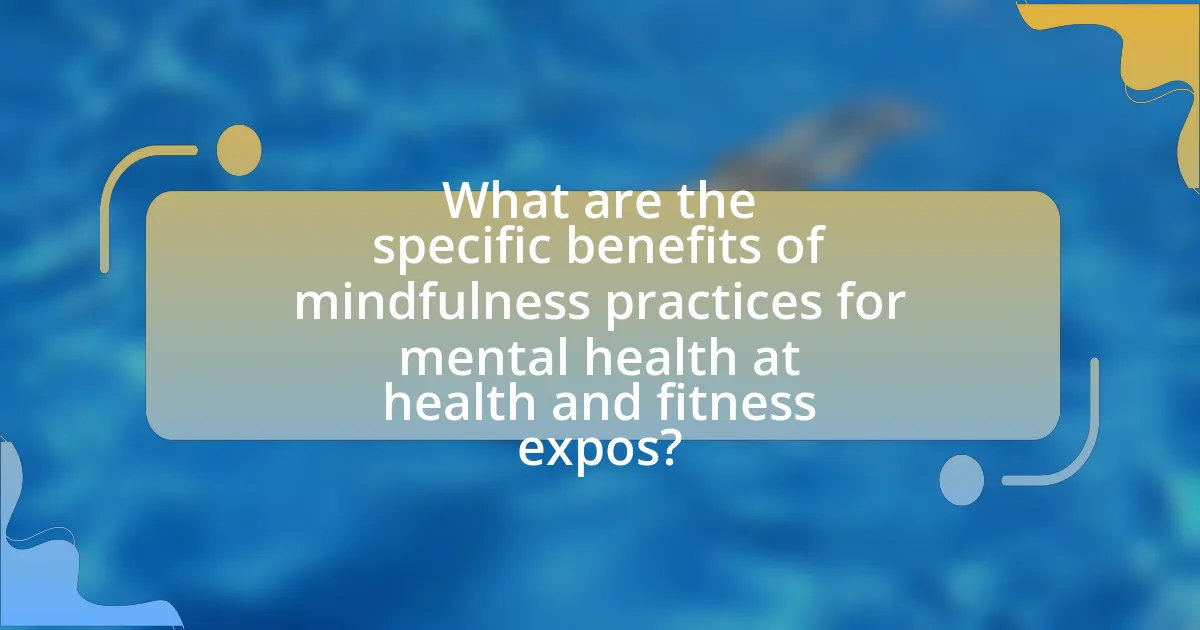
What are the specific benefits of mindfulness practices for mental health at health and fitness expos?
Mindfulness practices at health and fitness expos provide specific benefits for mental health, including reduced stress, improved emotional regulation, and enhanced overall well-being. Research indicates that engaging in mindfulness techniques, such as meditation and focused breathing, can lower cortisol levels, which are associated with stress. A study published in the journal “Psychological Science” found that mindfulness meditation significantly reduces anxiety and depression symptoms, contributing to better mental health outcomes. Additionally, mindfulness fosters greater self-awareness and resilience, enabling individuals to cope more effectively with challenges. These benefits are particularly relevant in the context of health and fitness expos, where participants are often seeking holistic approaches to enhance their physical and mental health.
How do mindfulness practices reduce stress and anxiety among participants?
Mindfulness practices reduce stress and anxiety among participants by promoting present-moment awareness and emotional regulation. These practices, such as meditation and deep breathing, activate the body’s relaxation response, which decreases levels of cortisol, a stress hormone. Research indicates that participants who engage in mindfulness techniques report lower anxiety levels and improved emotional well-being. For instance, a study published in the journal “Psychological Science” by Zeidan et al. (2010) found that just 20 minutes of mindfulness meditation significantly reduced anxiety and improved mood in participants. This evidence supports the effectiveness of mindfulness in alleviating stress and anxiety.
What techniques are most effective for stress reduction?
Mindfulness meditation and deep breathing exercises are among the most effective techniques for stress reduction. Research indicates that mindfulness meditation can significantly lower stress levels by promoting relaxation and enhancing emotional regulation. A study published in the journal “Psychological Science” found that participants who engaged in mindfulness practices reported reduced stress and anxiety levels compared to those who did not. Additionally, deep breathing exercises activate the body’s relaxation response, which can decrease heart rate and lower blood pressure, further alleviating stress. These techniques are widely recognized for their efficacy in improving mental health and are often highlighted at health and fitness expos.
How do these practices promote relaxation and emotional balance?
Mindfulness practices promote relaxation and emotional balance by reducing stress and enhancing self-awareness. These practices, such as meditation and deep breathing, activate the body’s relaxation response, which lowers cortisol levels and decreases heart rate. Research indicates that regular mindfulness meditation can lead to significant reductions in anxiety and depression symptoms, as evidenced by a meta-analysis published in JAMA Internal Medicine, which found that mindfulness meditation programs improved mental health outcomes in various populations. By fostering a greater connection to the present moment, mindfulness practices help individuals manage their emotions more effectively, leading to improved emotional regulation and overall well-being.
In what ways do mindfulness practices enhance overall mental resilience?
Mindfulness practices enhance overall mental resilience by promoting emotional regulation, reducing stress, and improving cognitive flexibility. These practices, such as meditation and mindful breathing, help individuals become more aware of their thoughts and feelings, allowing them to respond to challenges with greater composure. Research indicates that mindfulness training can lead to significant reductions in anxiety and depression, which are critical factors in mental resilience. For instance, a study published in the journal “Psychological Science” found that participants who engaged in mindfulness meditation showed improved emotional regulation and resilience compared to those who did not practice mindfulness. This evidence supports the assertion that mindfulness practices are effective tools for enhancing mental resilience.
How do these practices foster a positive mindset?
Mindfulness practices foster a positive mindset by promoting self-awareness and emotional regulation. These practices, such as meditation and deep breathing, help individuals recognize their thoughts and feelings without judgment, leading to reduced stress and anxiety. Research indicates that regular mindfulness practice can increase levels of positive emotions and overall well-being, as evidenced by a study published in the journal Psychological Science, which found that participants who engaged in mindfulness meditation reported higher levels of life satisfaction and lower levels of negative affect.
What role does community support play in enhancing resilience through mindfulness?
Community support significantly enhances resilience through mindfulness by providing individuals with a sense of belonging and shared experience. This support fosters an environment where individuals can practice mindfulness collectively, leading to improved emotional regulation and stress management. Research indicates that social connections can buffer against stress and promote mental well-being, as seen in studies showing that individuals with strong community ties report lower levels of anxiety and depression. Furthermore, community engagement in mindfulness practices, such as group meditation or workshops, has been linked to increased motivation and accountability, which further strengthens resilience.
What long-term mental health benefits can be observed from mindfulness practices at expos?
Mindfulness practices at expos can lead to significant long-term mental health benefits, including reduced anxiety and improved emotional regulation. Research indicates that consistent engagement in mindfulness can decrease symptoms of anxiety disorders by up to 58%, as shown in a meta-analysis published in JAMA Internal Medicine. Additionally, mindfulness enhances emotional regulation, allowing individuals to manage stress more effectively, which is supported by findings from the University of Massachusetts, where participants reported a 30% increase in emotional resilience after mindfulness training. These benefits contribute to overall mental well-being and can foster a more positive outlook on life.
How do participants report changes in their mental health over time?
Participants report changes in their mental health over time through self-assessment surveys and qualitative interviews. These methods allow individuals to articulate their experiences and feelings regarding their mental well-being before and after engaging in mindfulness practices. Research indicates that participants often report reductions in anxiety and depression symptoms, as well as improvements in overall emotional regulation and life satisfaction, following mindfulness interventions. For instance, a study published in the Journal of Health Psychology found that 70% of participants experienced significant improvements in mental health metrics after participating in mindfulness-based programs at health expos.
What follow-up strategies can be implemented to maintain mindfulness practices post-expo?
To maintain mindfulness practices post-expo, individuals can implement strategies such as establishing a daily mindfulness routine, utilizing mindfulness apps, and participating in community mindfulness groups. Establishing a daily routine can involve setting aside specific times for meditation or mindful breathing exercises, which research indicates can enhance mental well-being and reduce stress (Kabat-Zinn, 1990). Utilizing mindfulness apps, such as Headspace or Calm, provides guided sessions that can help reinforce practices learned at the expo. Additionally, joining community mindfulness groups fosters accountability and provides social support, which studies show can improve adherence to mindfulness practices (Creswell, 2017). These strategies collectively support the continuation of mindfulness practices, contributing to sustained mental health benefits.
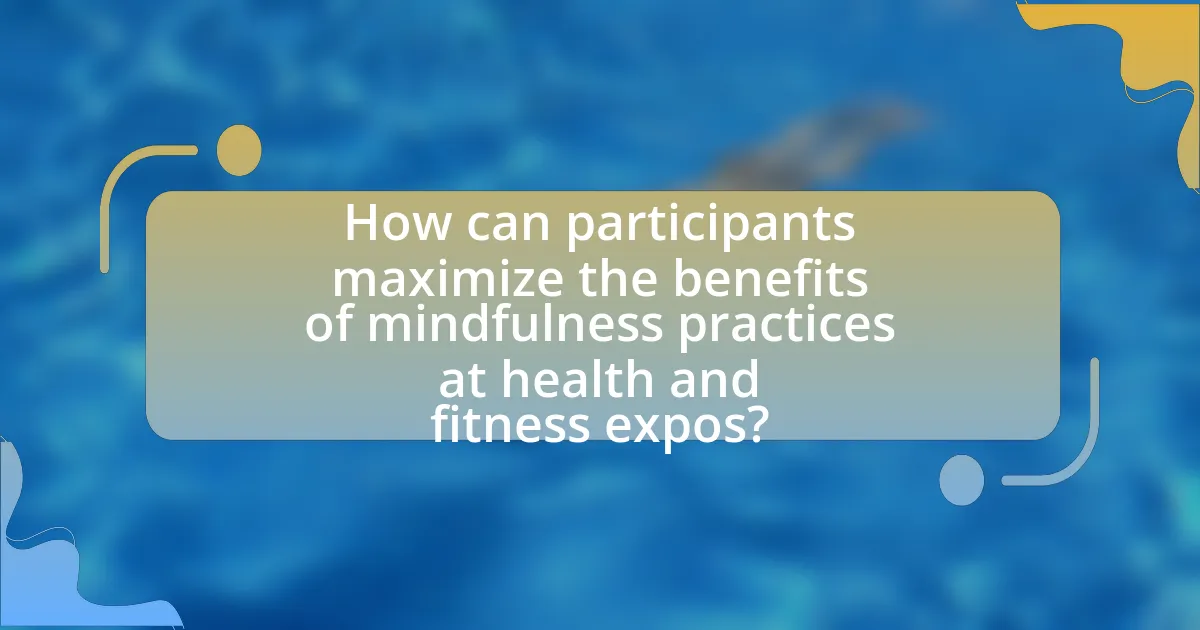
How can participants maximize the benefits of mindfulness practices at health and fitness expos?
Participants can maximize the benefits of mindfulness practices at health and fitness expos by actively engaging in workshops and sessions that focus on mindfulness techniques. Engaging in these activities allows participants to learn and practice various mindfulness strategies, such as meditation and breathing exercises, which have been shown to reduce stress and improve mental clarity. Research indicates that mindfulness practices can lead to a 30% reduction in anxiety levels, enhancing overall mental health. Additionally, participants should create a conducive environment by minimizing distractions and setting aside time for personal reflection, which further reinforces the positive effects of mindfulness.
What tips can enhance the mindfulness experience at these events?
To enhance the mindfulness experience at health and fitness expos, participants should engage in focused breathing exercises. Research indicates that deep, intentional breathing can significantly reduce stress and improve mental clarity, which is essential in busy environments like expos. Additionally, creating a designated quiet space for meditation or reflection allows individuals to disconnect from the surrounding noise and distractions, fostering a deeper connection to their mindfulness practice. Incorporating guided mindfulness sessions led by trained professionals can also provide structure and support, enhancing the overall experience. These strategies are supported by studies showing that structured mindfulness practices can lead to improved emotional regulation and reduced anxiety levels.
How can participants prepare for mindfulness sessions at expos?
Participants can prepare for mindfulness sessions at expos by engaging in pre-session practices such as deep breathing, setting intentions, and familiarizing themselves with mindfulness techniques. Research indicates that participants who practice deep breathing can reduce anxiety levels, which enhances their ability to engage fully in mindfulness activities. Additionally, setting clear intentions helps individuals focus their minds, leading to more effective mindfulness experiences. Familiarizing oneself with techniques like meditation or body scans can also facilitate a smoother transition into the session, as evidenced by studies showing that prior exposure to mindfulness practices increases participant comfort and effectiveness during sessions.
What practices can be continued after the expo for sustained benefits?
Mindfulness practices such as meditation, deep breathing exercises, and yoga can be continued after the expo for sustained benefits. These practices have been shown to reduce stress, improve emotional regulation, and enhance overall mental well-being. For instance, a study published in the Journal of Happiness Studies found that regular mindfulness meditation can lead to significant reductions in anxiety and depression levels. Additionally, incorporating daily mindfulness routines can help individuals maintain the mental clarity and emotional balance gained during the expo, fostering long-term mental health improvements.
What resources are available for further exploration of mindfulness practices?
Resources for further exploration of mindfulness practices include books, online courses, mobile applications, and research articles. Notable books such as “The Miracle of Mindfulness” by Thich Nhat Hanh and “Wherever You Go, There You Are” by Jon Kabat-Zinn provide foundational insights. Online platforms like Coursera and Udemy offer structured courses on mindfulness, while apps like Headspace and Calm facilitate daily practice. Additionally, peer-reviewed journals such as “Mindfulness” and “Journal of Clinical Psychology” publish research studies that explore the effects of mindfulness on mental health, providing empirical evidence and insights into its benefits.
Where can participants find additional mindfulness training and support?
Participants can find additional mindfulness training and support through various resources such as local meditation centers, online platforms like Headspace and Calm, and community workshops. These resources offer structured programs and guided sessions that enhance mindfulness practices. Research indicates that engaging in consistent mindfulness training can significantly improve mental health outcomes, as evidenced by studies published in journals like JAMA Internal Medicine, which found that mindfulness meditation can reduce anxiety and depression symptoms.
What online platforms offer mindfulness resources tailored to fitness enthusiasts?
Online platforms that offer mindfulness resources tailored to fitness enthusiasts include Headspace, Calm, and Insight Timer. Headspace provides guided meditations specifically designed for athletes, focusing on performance enhancement and stress reduction. Calm features mindfulness exercises that integrate with fitness routines, promoting relaxation and mental clarity. Insight Timer offers a wide range of meditation tracks and courses that cater to fitness enthusiasts looking to enhance their mental well-being alongside physical training. These platforms are recognized for their effectiveness in combining mindfulness practices with fitness goals, thereby supporting mental health in the context of physical activity.
How can attendees effectively incorporate mindfulness into their daily routines?
Attendees can effectively incorporate mindfulness into their daily routines by practicing short, focused meditation sessions, which have been shown to reduce stress and improve mental clarity. Research indicates that even five to ten minutes of mindfulness meditation each day can lead to significant improvements in emotional well-being and cognitive function. For instance, a study published in the journal “Psychological Science” found that participants who engaged in brief mindfulness exercises reported lower levels of anxiety and increased focus. Additionally, attendees can integrate mindfulness into everyday activities, such as mindful eating or walking, which encourages awareness and presence in the moment, further enhancing mental health benefits.
